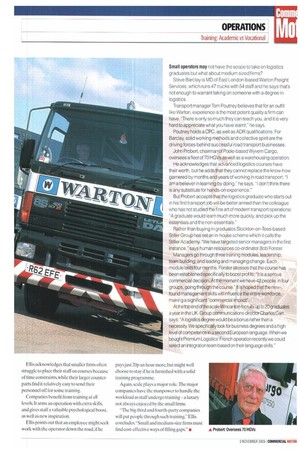Small operators may not have the scope to take on logistics graduates but what about medium sized f Irms?
Page 57

If you've noticed an error in this article please click here to report it so we can fix it.
Steve Barclay is MD of Fast London-based Warton Freight Services, which runs 47 trucks with 54 staff and he says that's not enough to warrant taking on someone with a degree in logistics.
Transport manager Tom Poutney believes that for an outfit like Warton, experience is the most potent quality a firm can have. "There is only so much they can teach you, and it is very hard to appreciate what you have learnt," he says.
Poutney holds a CPC, as well as ADR qualifications. For Barclay, solid working methods and collective spirit are the driving forces behind successful road transport businesses.
John Probert, chairman of Poole-based Wyvern Cargo, oversees a fleet of 70 HGVs as well as a warehousing operation.
He acknowledges that advanced logistics courses have their worth, but he adds that they cannot replace the know-how garnered by months and years of working in road transport. "I am a believer in learning by doing," he says. "I don't think there is any substitute for hands-on experience."
But Probert accepts that the logistics graduate who starts out in his first transport job will be better armed than the colleague who has not studied the fine art of modern transport operations: "A graduate would learn much more quickly, and pick up the essentials and the non-essentials."
Rather than buying in graduates Stockton-on-Tees-based Stiller Group has set an in-house scheme which it calls the Stiller Academy. "We have targeted senior managers in the first instance," says human resources co-ordinator Bob Forster.
Managers go through three training modules: leadership; team building; and leading and managing change. Each module lasts four months. Forster stresses that the course has been established specif ically to boost profits: "It is a serious commercial decision. At the moment we have 42 people, in four groups, going through the course." It is hoped that the newfound management skills will influence the entire workforce, making a significant "commercial impact".
At the top end of the scale Wincanton recruits up to 20 graduates a year in the UK. Group communications director Charles Carr says: "A logistics degree would be a bonus rather than a necessity. We specifically look for business degrees and a high level of competence in a second European language. When we bought Premium Logistics' French operation recently we could select an integration team based on their language skills."










































































































































































































